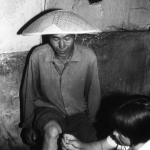Articles tagged with: Health
jj blog »

China’s reform of its health care system in the latter half of the 1990s and early years of the new millennium was pretty much a disaster. See Wang Shaoguang’s piece published here, and if you have journal access, I would recommend Wang’s recent article State extractive capacity, policy orientation, and inequity in the financing and delivery of health care in urban China. Chen Meei Shia’s article also gives a great overview of what’s changed since the Mao era: The Great Reversal: Transformation of Health Care in the People’s Republic of China.
So it is especially encouraging to see that as more and more people are added to China’s municipal and provincial health insurance plans, the government is starting to flex its bargaining power:
Chinese Revolutionary History, jj blog, Rural China »

Thanks to DD for forwarding this fascinating full-length documentary on barefoot doctors in China, shot primarily in 1975.
For an excellent history of the rise and demise of the barefoot doctors in China (and the Cooperative Medical System, of which the barefoot doctors were a part of), I highly recommend: Chen Meei Shia’s “The Great Reversal: Transformation of Health Care in the People’s Republic of China“, in Cockerham, William C [ed] (2004) The Blackwell companion to medical sociology. Blackwell.
Contemporary China »
Does the PRC’s staggering economic growth confirm the thesis that wealthier is healthier? Using life expectancy data from three decades, Sanjay Reddy measures China’s advances against those of other countries and finds explanations for its relatively poor performance in the marketization of health care and shrinkage of state spending since 1980.
Contemporary China, Rural China »
It has been 25 years since China’s rural reforms began, which at the time were dubbed by some observers of Chinese politics as the second revolution. However, twenty five years later, scholars of the China field are still debating the nature of the reform: Was it top down, or bottom up? While it may seem trivial to debate how the reform started in the face of the total transformation of Chinese society in the last twenty five years, the answer to this question has tremendous implications for the future of China. The implications include how we should look at the Chinese revolution and China’s socialist experiment and experiences, and what development trajectory rural China should take.
The Chinese government and its controlled press have portrayed the rural reform as a spontaneous response of Chinese farmers to the failure of collective farming system. In this official version of the history, 18 families of farmers in Xiao Gang village, Fengyang County, Anhui Province, decided to divide their land among themselves. They signed a pledge that if anyone were arrested for this action, the rest would take care of their families until their children were 18 years old. Along with this portrayal of the bottom up nature of the rural reform, the Chinese Government and its press also were also harsh critics of the collective farming in the initial years of the reform. They used isolated cases, like leveling fishing pond in the drive to increase grain production, and curtailing household animal husbandry, to condemn the collective farming as unreasonable and irrational, which have poisoned many people’s understanding of the collective farming in China.

